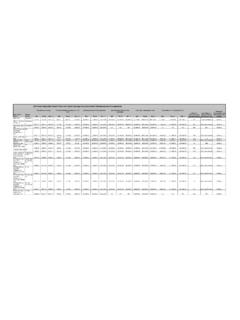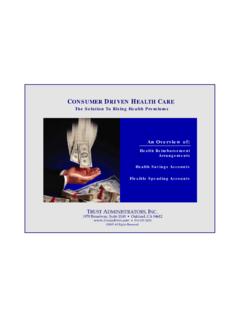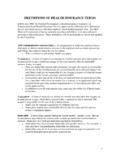Transcription of Health Savings Accounts – Frequently Asked …
1 Health Savings Accounts Frequently Asked Questions 1. With an HSA, do I have insurance? Yes, you must have a qualified- high deductible Health plan to contribute to an HSA. 2. Who owns the HSA bank account ? You do. 3. Does the money in an HSA earn interest? Yes, tax deferred. Your interest rate will depend on the balance in your account . 4. Can the money in an HSA be invested? Yes, just like an IRA, the money can be invested in stocks/bonds, mutual funds, CDs, and annuities. Investment options will be made available to the HSA account holder when there are sufficient funds in the HSA. 5. Is my HSA FDIC insured? Yes, it is. However, if you choose to invest the money in the HSA, those investments will not be. 6. Can I roll the money from my IRA into my HSA?
2 Yes. You may conduct a once in a life time rollover from your IRA into your HSA to help seed your account . This rollover counts toward your yearly contribution limit. At this time, you can not roll money into your IRA from your HSA. 7. Who can put money in the HSA bank account ? Anyone can contribute to your HSA, however, only the account holder and their employer receive the tax deductions. 8. What happens to the money in the HSA if I leave my job or retire? You take that money with you wherever you go. The HSA is in your name. It is your account . If you are Medicare enrolled or go to another employer that does not have a qualified high deductible Health plan, you can still use your HSA money to pay for co-pays and qualified medical expenses.
3 However, under these circumstances, you cannot put any more money in your HSA. 9. Does the money I have in my HSA rollover from year to year, or do I lose the money at the end of the year? The money rolls over year to year. You do not lose the money in the HSA. It is your money. 10. How much money can I contribute to an HSA per year? In 2007, the maximum set by the IRS for an individual is $2,850 and the maximum contribution for family coverage is $5,650. These rates are subject to change every year, due to inflation. 11. Can I take the money out of the HSA whenever I want? Yes, but if it is not used for qualified medical expenses, you will have to pay income taxes on that money plus a 10 percent tax penalty. 12. What is a qualified medical expense?
4 Qualified medical expenses are those that would generally qualify for the medical and dental expenses income tax deduction. These are explained in IRS Publication 502, Medical and Dental Expenses. Go to for specifics on what expenses are covered. 13. Are there co-pays with an HSA? There are no co-payments under the deductible . Some plans may have co-payments over the deductible . 14. I am a parent on the HSA plan but did not cover my children under this plan. Can I use the money in my HSA to pay for my children's medical expenses like co-pays and deductibles? Yes, the money in your HSA can then be used to pay for any tax dependent family member, but will not be applied toward your deductible . 15. I have a domestic partner on my insurance plan with me.
5 Can I use the money in my HSA for my domestic partner's medical expenses? The law states that money in an HSA can only be used for yourself, your spouse, and your tax dependents. If your domestic partner meets the IRS qualifications to be considered a tax dependent, you can legally use your HSA funds for his or her medical expenses. If they do not meet this qualification, you can not. 16. I am retired. Can I still contribute to my HSA? Yes, if you are also covered on a qualified high deductible plan and you are not already on Medicare. 17. Once I am enrolled in Medicare can I still contribute money into my HSA? No. 18. If my spouse is enrolled in Medicare, can I still contribute to an HSA? Yes, as long as you are not enrolled in Medicare you can contribute to an HSA.
6 You may use the money to pay the cost of qualified medical expenses for you and your spouse. 19. Can the money in an HSA be used to pay non-medical expenses? Yes, but you will be taxed plus penalized 10 percent of the amount used. 20. Is there ever a case in which there is no 10 percent penalty when HSA money is used for non-medical expenses? Yes. Once you are 65 years old there is no 10 percent penalty. You still pay taxes on non-medical expenses. 21. Can I purchase eye glasses, contacts, or LASIK surgery with the money in the HSA? Yes, but it may not apply towards your medical deductible . 22. Can I use the money in the HSA to pay for dental expenses, including orthodontia? Yes, but it may not apply towards your medical deductible .
7 23. Can I use the money in the HSA to pay for voluntary cosmetic surgery? No. The HSA can be used for cosmetic surgery if prescribed 24. Do I pay for the full Doctor's office visit when I go to the doctor? Some doctors may require you to pay upfront, but most will bill you later. Remember, you are only responsible to pay the discounted amount as determined by your insurance benefit. Do not let the doctor overcharge you at the point of service.






